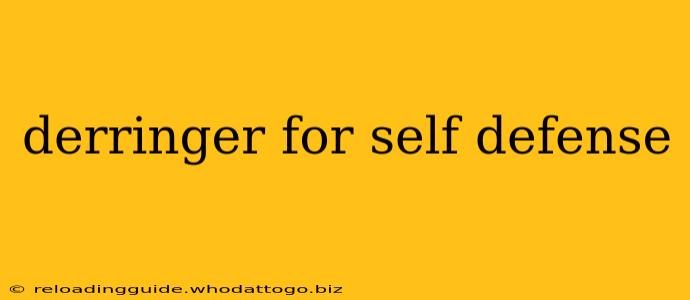The derringer, a small, easily concealable handgun, has long held a place in popular culture, often associated with outlaws and secret agents. But is a derringer a practical choice for self-defense in the modern world? This comprehensive guide delves into the pros and cons, exploring the realities of using a derringer for personal protection.
Understanding the Derringer: History and Design
Derringers, named after Henry Deringer (note the spelling difference!), are single-shot or multi-shot pistols characterized by their compact size and relatively low caliber. Their small size allows for easy concealment, making them attractive to those seeking a discreet self-defense option. However, this small size comes with inherent limitations. Historically, derringers were often black powder firearms, but modern versions utilize centerfire cartridges.
Pros of Using a Derringer for Self-Defense
- Concealability: This is the primary advantage. A derringer's diminutive size allows for easy concealment in pockets, purses, or even inside a boot. This makes it a viable option for individuals who prioritize discreet carry.
- Simplicity: Derringers are generally simple to operate, requiring minimal training to learn basic functionality. This is a plus for individuals who are new to firearms.
- Cost-Effectiveness: Some derringers are relatively inexpensive, making them an accessible option for those on a budget.
Cons of Using a Derringer for Self-Defense
- Limited Capacity: Most derringers have a very low capacity, typically one or two shots. This severely limits your ability to engage multiple threats. A missed shot could be catastrophic.
- Low Caliber: Many derringers utilize low-caliber rounds, resulting in less stopping power compared to larger handguns. While some modern derringers use more potent cartridges, the overall power is still less than larger calibers.
- Accuracy Challenges: The short barrel and small size can make accurate shooting challenging, especially under stress. Precise shot placement is crucial for effective self-defense, and a derringer can hinder this.
- Recoil: While the small size may seem to suggest less recoil, the short barrel often leads to a sharp, snappy recoil, potentially impacting follow-up shots.
- Reliability Concerns: While modern derringers are generally reliable, the simple mechanism can be susceptible to malfunctions if not properly maintained.
Alternatives to Consider
Before settling on a derringer, consider alternatives that offer greater capacity, stopping power, and accuracy. Small semi-automatic pistols or revolvers often provide a more effective self-defense solution, while still allowing for relatively easy concealment. Remember that effective self-defense involves more than just the weapon; training is paramount.
Training and Responsible Gun Ownership
Regardless of the firearm chosen, extensive training is absolutely essential. This includes proper handling, safety procedures, and marksmanship practice. Familiarize yourself with your local laws and regulations concerning firearm ownership and concealed carry. Responsible gun ownership involves understanding the legal and ethical implications of carrying a firearm for self-defense.
Conclusion: Is a Derringer Right for You?
A derringer's compact size and ease of concealment are undeniable advantages. However, its limitations in capacity, power, and accuracy must be carefully considered. For many, the drawbacks outweigh the benefits, particularly in situations where you may face multiple attackers. While a derringer might suit a very specific niche, for most individuals seeking reliable self-defense, a more powerful and versatile handgun is recommended. Always prioritize thorough training and responsible gun ownership. Consult with a firearms expert and law enforcement professionals to determine the best self-defense option for your individual needs and circumstances.

